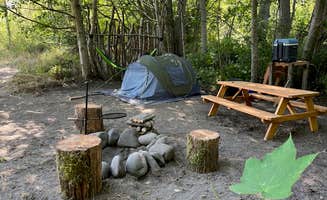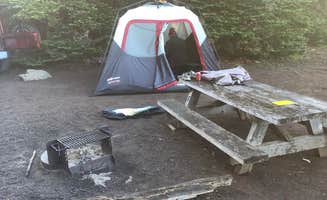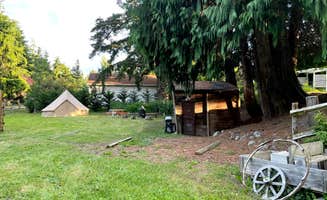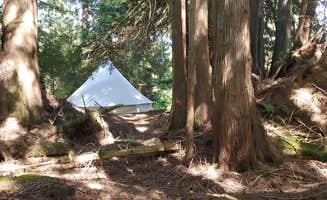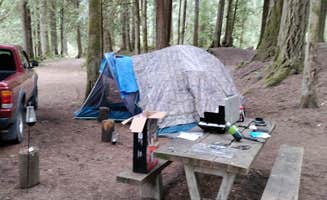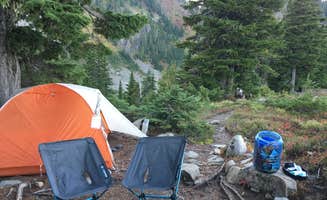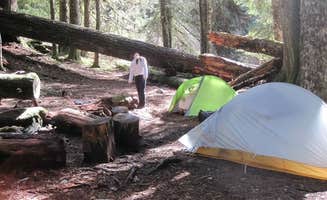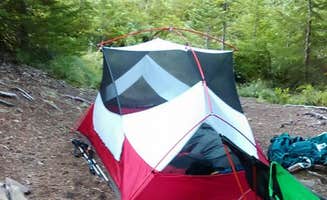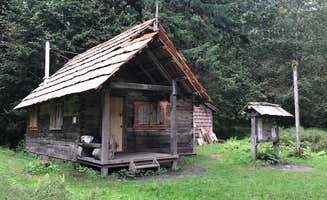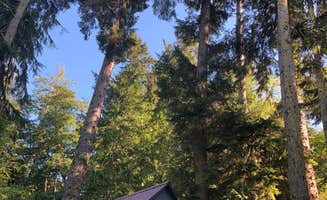Tent camping near Port Angeles, Washington offers access to distinct ecosystems within Olympic National Forest, with elevations ranging from sea level to alpine zones above 5,000 feet. Summer temperatures typically range from 45-75°F, though weather patterns can shift rapidly with fog rolling in even during July and August. Campers often encounter wildlife including deer, mountain goats, and black bears throughout the region's diverse landscapes.
What to do
Hiking to Lunch Lake: A challenging backcountry experience on the Seven Lakes Basin loop trail requires proper permits and preparation. "This hike has it all: old growth forests, alpine lakes, wildlife, year-round snow," notes one camper at Lunch Lake. The trail features several waterfalls along the route with opportunities to spot wildlife.
Wildlife viewing: Black bear sightings are common in the Olympic wilderness. A camper at Lunch Lake reported, "We did see 12 black bears total on our hike, 3 of which were at our campsite. They were busy eating berries and didn't bother us. Bear bins are required for backcounty camping."
Visit alpine lakes: Several high-elevation lakes offer swimming opportunities after strenuous hikes. A visitor to Boulder Lake shared, "Boulder Lake is amazing and almost nobody camps up there it seems. Find a nice spot along the lake and take a dio in the lake as a reward for making it all this way!"
Stargazing: Clear nights at higher elevations provide exceptional celestial viewing conditions. A camper at Deer Park Campground explained, "That night it got so dark we were blanketed in stars and it was simply amazing."
What campers like
Scenic river sites: Many Olympic Peninsula campsites offer direct water access. "There is one pot toilet in an 'outhouse' and they also have prestrung bear wires set up in a section of camp away from the sites," explains a camper about Lillian. "This site was gorgeous! Directly next to the river(there are a couple of sites set back away from the river as well)."
High country views: Elevated campgrounds provide panoramic vistas of mountain ranges. A visitor to Deer Park noted, "High and remote. It's not glamping, by any means. Sites are nice, but there's very little in between them for privacy. Views are incredible."
Secluded forest camping: Small, less-visited campgrounds offer quiet experiences away from crowds. "Tiny campground on the river: no reservations, toilets, but no safe water, no trash collection," shares a camper about Dungeness Forks Campground. "The campground is bordered on two sides by rivers and you will be lulled to sleep by the sound of the water."
Free dispersed sites: Some areas provide no-cost camping with basic amenities. A visitor to Slab Camp/Deer Ridge Trailhead reported, "There are about 5 sites with rock fire pits and a decent amount of space. A nice quiet place to spend the night even if you're not trying to hike."
What you should know
Road conditions: Access to some campgrounds requires navigating challenging roads. "Scariest road i've ever driven on. very narrow steep cliffs on the side. please be careful of oncoming traffic when turning corners!" warns a camper about the route to Deer Park Campground.
Bear safety: Black bears are common throughout the Olympic Peninsula. Proper food storage is essential at all sites. "They also have prestrung bear wires set up in a section of camp away from the sites. Obviously, this site is primitive and you will need to filter your water from the river and try to have a bear canister with you as well," advises a Lillian camper.
Weather preparedness: Conditions can change rapidly, especially at higher elevations. "We arrived here while beginning our trip around the Olympic peninsula. We unfortunately got caught in rain for almost 2 weeks," shares a Dungeness Forks visitor. "The campground would be a dream in better weather."
Limited water access: Many sites require campers to bring their own water or filter from streams. At Deer Park, "no running water is available so pack in what you need," reports one camper, while another notes, "There is no water, so bring your own and there a couple of vault toilets."
Tips for camping with families
Consider glamping options: For families wanting more comfort, structured accommodations exist. "There's RV sites tent sites and Glamping tents there's one with a king bed for couples and 1 with a king bed and a twin bed for families," notes a visitor to Weekend Worrior Camping. These sites include bedding and basic furnishings.
Plan for wildlife encounters: Children often enjoy seeing deer and other animals. "We also saw a lot of deer right by our tent," reports a Deer Park camper, while another mentions, "There's deer and elk that come through the camp."
Check campsite spacing: Some areas have closely positioned sites that may not suit families needing privacy. At Elk Lake, one camper noted, "Campsites are small and close together so just a note. Has toilet and bear hangs in a central location."
Prepare for temperature changes: Even summer nights can get cold, especially at higher elevations. "Camping beneath massive old growth and near a waterfall makes for a chilly and dew laden morning," explains an Elk Lake visitor about morning conditions.
Tips from RVers
Road accessibility assessment: Narrow access roads make many campgrounds unsuitable for larger vehicles. "The drive up is a bit intense, but well worth it," mentions one camper about Deer Park, while another specifically warns, "The drive up is tight and not suitable for any type of trailer."
Site size limitations: RV spaces are limited throughout the region. A Dungeness Forks visitor noted, "Our 19ft campervan made it up and down but a car did need to pull off to the side for us and back up a ways for us to squeeze by. We did not tow anything behind us and I wouldn't recommend it."
Campground amenities: Facilities vary widely between established and primitive sites. "There were several open, they all appeared to have a fire pit, parking area for your one vehicle, picnic table, and spot for a tent. Two bathrooms without water were accessible," reports a Dungeness Forks camper about site arrangements.




